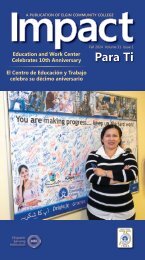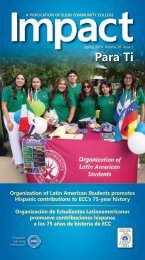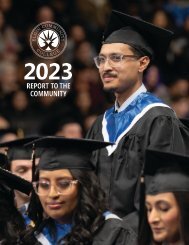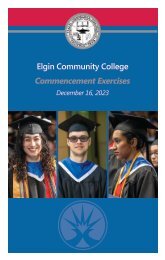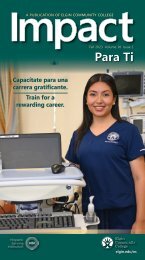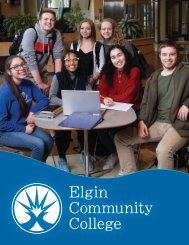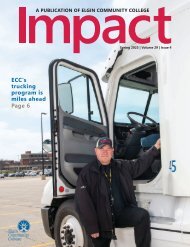ILEA Equity Plan | Elgin Community College (ECC)
There are wide and persistent gaps in college completion rates in Illinois, especially among students of color and low-income students. After an in-depth analysis of our institutional data, Elgin Community College (“ECC” or “the College” or “we” or “our”) has developed an Equity Plan containing annual growth targets for which progress updates will be shared publicly over the next five years. Our Equity Plan reflects the unique characteristics of our institution. For example, ECC is designated as a Hispanic Serving Institution by the US Department of Education, with just over 42% of the students identifying as Latinx or Hispanic. Also, the district served by ECC is widely diverse in terms of income and educational attainment. We will identify the obstacles students face and develop programs and policies that break down unnecessary college graduation barriers. Along with our fellow colleges, in the Partnership for College Completion organization, with this Illinois Equity in Attainment (“ILEA”) plan, we pledge to close the completion gaps by 2025.
There are wide and persistent gaps in college completion rates in Illinois, especially among students of color and low-income students. After an in-depth analysis of our institutional data, Elgin Community College (“ECC” or “the College” or “we” or “our”) has developed an Equity Plan containing annual growth targets for which progress updates will be shared publicly over the next five years. Our Equity Plan reflects the unique characteristics of our institution. For example, ECC is designated as a Hispanic Serving Institution by the US Department of Education, with just over 42% of the students identifying as Latinx or Hispanic. Also, the district served by ECC is widely diverse in terms of income and educational attainment. We will identify the obstacles students face and develop programs and policies that break down unnecessary college graduation barriers. Along with our fellow colleges, in the Partnership for College Completion organization, with this Illinois Equity in Attainment (“ILEA”) plan, we pledge to close the completion gaps by 2025.
Create successful ePaper yourself
Turn your PDF publications into a flip-book with our unique Google optimized e-Paper software.
The OLAS Expansion and Outreach strategy is connected to other institutional efforts and<br />
supports <strong>ECC</strong>’s strategies in our 2018-2022 Strategic <strong>Plan</strong>. See Table 9 for specific strategies<br />
that are aligned.<br />
The Success Indicators used to demonstrate this strategy is having an impact are:<br />
• Student completion of course and programs<br />
• Student progression through coursework<br />
• Student job attainment<br />
• Transfer to subsequent educational institutions<br />
• Student engagement and satisfaction with college programs and services<br />
• Enrollment of identified target populations<br />
• Preparedness of graduates for transfer and/or employment<br />
• Responsiveness to student and community needs<br />
<strong>ILEA</strong> EQUITY PLAN STRATEGY 5: COMPLETE TO COMPETE GRANT<br />
The purpose of the Complete to Compete Grant strategy is to give support to financially<br />
disadvantaged students who are most at-risk of not completing their degrees compared to their<br />
peers.<br />
Born out of the desire of the Foundation Board to want to do more for students, the question,<br />
“What problem must be solved?” was asked. The foundation used volunteers in a call<br />
campaign to stopped out students in order to better understand why they stopped out so close<br />
to completion. A common response was due to a lack financial resources. This feedback,<br />
coupled with the Strategic <strong>Plan</strong> which guides every day decisions, the answer became clear:<br />
provide financial support for those students close to completing their 60 hours for a degree<br />
who are at highest risk of stopping out (based on predictive analytics) for reasons outside of<br />
academics. For example, students may have to work more to afford school and regular living<br />
expenses or child care, so they are unable to attend school full-time.<br />
As this idea was further explored, it was determined it wasn’t enough to pay for the direct costs<br />
to attend (i.e., credits), rather the need is to offset income so the student did not have to work<br />
as much and could focus on school. Therefore, money from the Complete to Compete grant is<br />
allowed to be spent on ancillary costs (e.g., bills, day care, etc.). It is “no strings attached” as<br />
long as it is going to help the student finish school.<br />
This grant has been in development since January, 2019, and the first student recipients will<br />
receive their awards in Fall 2020. During Spring 2020, eligible students will be identified and an<br />
invitation to apply will be sent. Student eligibility requirements are to: have a least 45 credit<br />
hours completed by the end of Spring 2020; be able to finish within a year (end of 2021). Based<br />
on the requirements, there are approximately 350 students that will be invited to apply.<br />
As part of the selection criteria, a composite score will be calculated based on a set of<br />
characteristics used to identify those least likely to complete without an intervention. Some of<br />
40<br />
<strong>ILEA</strong> <strong>Equity</strong> <strong>Plan</strong><br />
Institutional Strategies




